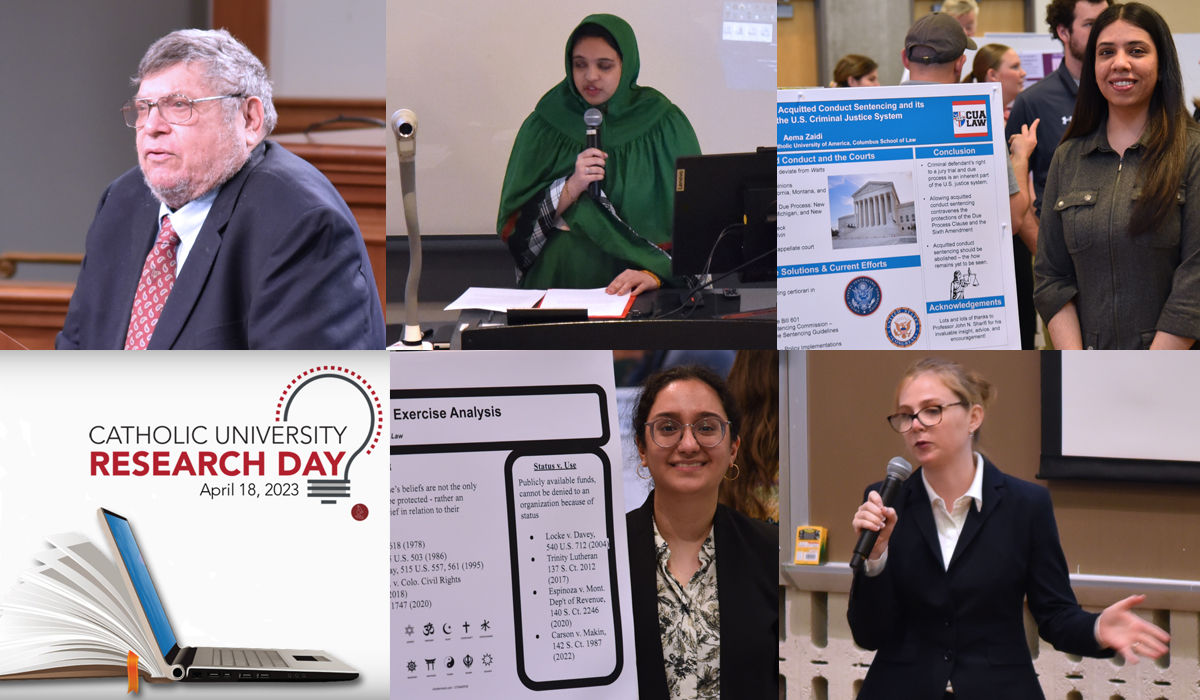 The Catholic University of America hosted its eighth annual Research Day Tuesday, April 18, 2023, with five of its participants hailing from the Columbus School of Law (Catholic Law). Third-year law students Mariyah Wakhariya, Monica Fry, Aema Zaidi, and Ida Namazi, as well as Professor Marshall Breger, each presented their own legal research, with topics ranging from conflict in the Old City of Jerusalem to ownership of NFTs.
The Catholic University of America hosted its eighth annual Research Day Tuesday, April 18, 2023, with five of its participants hailing from the Columbus School of Law (Catholic Law). Third-year law students Mariyah Wakhariya, Monica Fry, Aema Zaidi, and Ida Namazi, as well as Professor Marshall Breger, each presented their own legal research, with topics ranging from conflict in the Old City of Jerusalem to ownership of NFTs.
Breger, participating in the day’s first round of oral presentations, introduced his research entitled “Contest and Conflict at Jerusalem’s Holy Sites.” Detailing the explosion of religious conflict in Jerusalem’s Old City following the 1967 Six-Day War, Breger traced the evolution of Israel’s attitude toward the holy sites on the Temple Mount. Following the Six-Day War, Israel adapted the so-called status quo, whereby the state exerted its authority over the Temple Mount while the Jordanian-appointed Waqf administered the sacred Islamic site, under some form of Israeli security control, allowing Jews to visit the Mount but not to pray.
With the 2023 accession of Benjamin Netanyahu to a sixth term as prime minister, Jewish involvement on the Temple Mount has jumped, with ministers in the Netanyahu government going so far as to declare that it is “open for prayer.” Breger noted that this has increased tensions between Muslims and Jews, since both claim the Temple Mount as a crucial sacred site of their respective faiths. (Muslims view the Temple Mount as the sacred place both to which Muhammad traveled on his Night Journey and from which he ascended to heaven and returned; Jews regard it as both the site of the ancient Temple of Solomon, and the still-older Mount Moriah, where the patriarch Abraham nearly sacrificed his son Isaac.) In concluding his remarks, Breger proposed that Israel deconstruct the concept of sovereignty into constituent parts, thus providing opportunities for mutual collaboration without raising the difficult symbolic question of sovereignty. He similarly urged that Israel consult with interested parties—including the Waqf, the Palestinians, and Jordan—before making major decisions that impact them.
Wakhariya, showcasing her research in an oral presentation entitled “New Frontiers in Technology,” discussed the popular rise of “non-fungible tokens” (NFTs) and the intellectual property issues that come to the forefront as a result. In her presentation, Wakhariya identified a nascent problem surrounding NFTs. The digital nature of NFTs, which typically serve as parts of digital art collections, makes proving ownership a difficult task. She noted that there are three branches of intellectual property law that could potentially regulate NFTs—copyright, trademark, and patent law—but that applying these laws would still leave gaps. Wakhariya then proposed that ironclad purchase agreements serve as a solution until legislators or the courts directly address the intellectual property aspects of NFTs.
Fry, focusing on data privacy issues, gave an oral presentation entitled “Privacy in the Workplace: What Goes on Behind the Cubicles.” Tracing from its 1890 origin the evolution of the right to privacy theory, her presentation investigated current employers’ increased usage of software for invasive employee micro-monitoring practices, ostensibly to increase productivity. She likewise noted these practices collect, record, and preserve personal information not only about the employee but also their family members including their children. Highlighting that, save California through the CPRA, there is no federal or state privacy law addressing employees’ right to privacy, Fry concluded by advocating for the passing of an all-encompassing privacy law at the federal level.
Both Zaidi and Namazi presented their research findings during the poster presentation session in the Pryzbyla Center.
Zaidi’s research, entitled “Abolishing Acquitted Conduct Sentencing,” assessed the ways acquitted conduct sentencing affects criminal defendants in both state and federal courtrooms. Acquitted conduct sentencing allows a sentencing judge to consider a defendant’s past conduct in previous trials, even if a jury has previously ruled that the defendant is not guilty of that past conduct. Zaidi argued that this practice is unconstitutional because it violates a criminal defendant’s rights of due process and of trial by jury.
Namazi’s research, entitled “Three Dichotomies of Free Exercise Analysis,” examined the free exercise clause of the First Amendment and posited that every First Amendment ruling by the Supreme Court fits one of three distinctions. Namazi identified these distinctions as “status versus belief,” “status versus conduct,” and “status versus use.” The first addresses the confrontation between religious beliefs and criminal statutes; the second, the right of an individual to object to conduct in conflict with his religious beliefs; and lastly, the third, the use of publicly available funds to provide non-religious products or services even if the funded institution is religiously affiliated.
